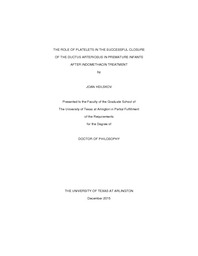| dc.description.abstract | Premature birth (birth before 37 weeks gestation) remain a global problem with negative consequences profundly affecting the infants, their families, and society. Persistent patent ductus arteriosus (PDA) is a significant complication seen in preterm infants. Premature infants with persistent PDAs are at increased risk for morbidity and mortality. Indomethacin is reported to successfully close the PDA in only 20-40 percent of infants whose birth weights are less than 1,000g. Common side effects of Indomethacin include renal dysfunction, gastric perforations, and decreased cerebral blood flow and perfusion. Several studies have shown thrombocytopenia is associated with persistent PDA in premature infants who have received indomethacin. The purpose of this cohort study was to compare circulating platelet counts in premature infants with persistent PDA versus those with DA closure after Indomethacin treatment. This retrospective cohort study compared the platelet counts of two groups of premature infants after Indomethacin treatment for hemodynamically-significant PDA (hsPDA). The data for this study were obtained from electronic medical records of infants in a large, Level III neonatal intensive care unit. The sample consisted of 63 premature infants who were diagnosed with a patent ductus arteriosus and received Indomethacin. Nineteen pecent of the infants treated with Indomethacin had successfully closed ductus arteriosus. No associations were found between platelet counts and successful closure of the DA after receiving Indomethacin. There were also no significant differences between the two (closed-PDA and open-PDA) groups with regards to gender, race, birth weight, gestation at birth, size of PDA, and respiratory support. Further research is needed to examine possible predictors of successful PDA closure and Indomethacin. | |

